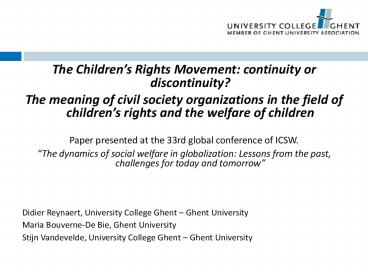The Childrens Rights Movement: continuity or discontinuity - PowerPoint PPT Presentation
1 / 13
Title:
The Childrens Rights Movement: continuity or discontinuity
Description:
What is the meaning of the children's rights movement in seeking to enhance the ... Children's rights movement opened the discussion on the position of children in ... – PowerPoint PPT presentation
Number of Views:189
Avg rating:3.0/5.0
Title: The Childrens Rights Movement: continuity or discontinuity
1
- The Childrens Rights Movement continuity or
discontinuity? - The meaning of civil society organizations in the
field of childrens rights and the welfare of
children - Paper presented at the 33rd global conference of
ICSW. - The dynamics of social welfare in globalization
Lessons from the past, challenges for today and
tomorrow - Didier Reynaert, University College Ghent Ghent
University - Maria Bouverne-De Bie, Ghent University
- Stijn Vandevelde, University College Ghent
Ghent University
2
Overview
- Rationale
- The Child Saving Movement
- The Childrens Rights Movement
- Merits of the Children's Rights Movement
- Questioning the Childrens Rights Movement
- The Childrens Rights Movement continuity or
discontinuity? - The role of civil society organizations in the
field of childrens rights contemporary research
agenda
3
Rationale
- 1948 Adoption of the Universal Declaration on
Human Rights - 1989 Adoption of the U.N. Convention on the
Rights of the Child (UNCRC) - Fifty years of human rights for children
- What is the meaning of the children's rights
movement in seeking to enhance the welfare of
children?
4
The Child Saving Movement (1)
- Child Saving Movement (beginning 20th century)
- Precursors of the contemporary childrens rights
movement - Welfare perspective on childhood
- Children are objects in need of protection
because of their vulnerability - Childhood image of the incompetent child
- Children as not-yet-beings, adults in waiting
- Focus on protection rights of children
- Creation of a youth land or moratorium
towards adulthood
5
The Child Saving Movement (2)
- Institutionalized in Western Europe through first
childrens laws. In Belgium - Youth Protection Act (1912)
- Act on compulsory education (1914)
- Act on the prohibition of child labour (1889)
- Development of social work in the modern
industrial society
6
The Childrens Rights Movement
- Childrens Rights Movement (sixties and
seventies) - In the slipstream of the child liberationist
movement - Alternative pedagogical model for dealing with
children, representing rights perspective on
childhood - Children are social actors
- Children are autonomous and competent human
beings - Rejecting the moratorium-idea youthland social
problem (Bring children back in society) - Adoption of the UNCRC in 1989 rights as an
instrument for social change
7
Merits of the Children's Rights Movement
- Children become visible and interests are taken
into account - Enforceability of children's rights (hard law)
- Consequences for practice and policy-making
emerge of new practices - Participation practices (in welfare
organizations, at school and in the family) and
advocacy practices - Child rights policy
- Children's rights movement opened the discussion
on the position of children in society the
pursuit for a larger respect of the human dignity
for children
8
Questioning the Children's Rights Movement (1)
- Emphasizing autonomy and participation rights as
the individual responsibility of children - Dichotomizing relationships between children and
educators, in particular their parents - Shift from childrens rights to duties of
children, e.g. - Youth offending (discourse of responsibilisation)
- Negotiating in families
- Shift from responsibility of state to
responsibility of children and parents - Shift from social problem to individual problem
- Paradox outcome further marginalization of
children? - Children as entrepreneurial selves
9
Questioning the Children's Rights Movement (2)
- The UNCRC as the benchmark of the childrens
rights discourse - Euphoric belief in positive consequences of
childrens rights - Consensus thinking on childrens rights (pensée
unique) - Discussion on the meaning of childrens right
disappears - technicallization of childrens rights
Implementing the UNCRC gap-problem - decontextualization of childrens rights
- Ignoring the social-historical context
- Ignoring the diversity under children
- the global childrens rights industry
10
The Childrens Rights Movement continuity or
discontinuity? (1)
- Educationalisation (Pädagogisierung)
1. Children as entrepreneurial selves
2. The global childrens rights industry
Individualization
Professionalization
11
The Childrens Rights Movement continuity or
discontinuity? (2)
- The Childrens Rights Movement as an alternative
way of dealing with children a counter movement
towards the process of educationalization - Vs.
- The Childrens Rights Movement as the
continuation or even radicalisation of the old
paradigm
12
The role of civil society organizations in the
field of childrens rights contemporary research
agenda
- Research along the lines of educationalization
offers contemporary research agenda for the
childrens rights movement - On what grounds interventions by civil society
organizations on childrens rights are
legitimized? - By whom?
- Regarding who?
- With what effects these interventions are
attendant? - Shifting from a competence debate to a social
political debate on childrens rights focus on
what childrens rights organisations do
13
Question time?
- Contact details
- Didier Reynaert
- Research assistant
- University College Ghent
- Faculty of Social Work and Welfare Studies
- Voskenslaan 362
- 9000 Ghent
- Belgium
- Tel. 0032 (0)9/242.26.68
- Fax 0032 (0)9/243.87.93
- E-mail didier.reynaert_at_hogent.be

